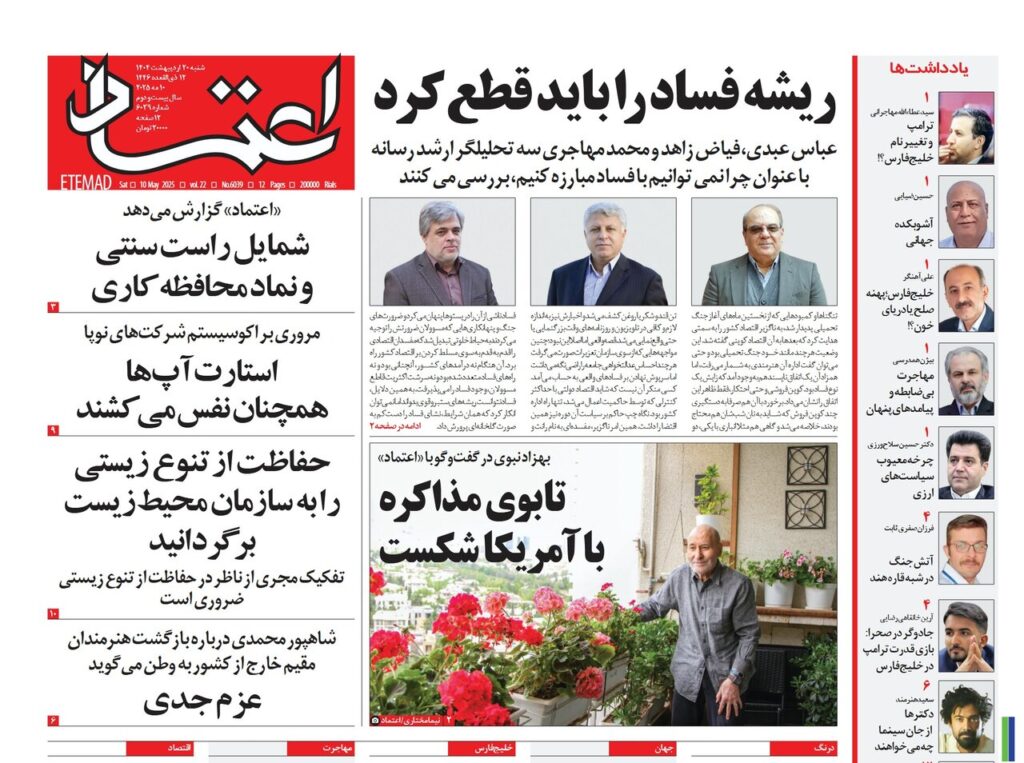Tehran – In his commentary, Etemad discusses Trump’s agreement with Yemen’s Ansalala, writing: The agreement will stop Yemeni groups from halting attacks on commercial vessels and stopping the attacks on Yemeni that have stopped the attacks on Yemeni.
While the agreement appears to be reciprocal, according to some analysts, it will not only reduce the risk of escalating the crisis in sensitive maritime corridors, but also reduce the risk of strengthening nuclear diplomacy between Tearan and Washington, but also have broad geopolitical consequences. This ceasefire could portend a more comprehensive negotiation between Tehran and Washington, particularly in situations where Iran claims to negotiate only about a nuclear program. Furthermore, for Iran, supporting a reduction in maritime tensions is consistent with some strategic goals, particularly in situations where Tehran is still under US sanctions, and stabilizing the situation in the Red Sea could provide a calm atmosphere of diplomatic relations.
Siasat-e-Rooz: Propaganda with fake MEK documents
Siasat-e-Rooz dedicated the article to Fox News’ false claims. According to the paper, Fox News claims it has discovered Iran’s new secret nuclear facility by publishing satellite images from the terrorist group MEK (also known as MKO). The reissue of fake information by sources such as Fox News and MEK reveals two simultaneous crises. First, after the inability to stand up to Palestinian resistance, the crisis of legitimacy of global Zionism spreads lies to attack Iran. Second, the Israeli regime’s strategic despair that it cannot manipulate regional diplomacy is consistent with the positive trends in the US ceasefire agreement with Yemen and Iran’s nuclear negotiations. Using groups like MEK that are not even reliable in Western countries also indicates that media campaigns against Iran have reached the end of trustworthy options. The claims of the new nuclear site are, in fact, a nervous response to Iran’s regional weight rise and the role of Tehran as an effective player in regional multipolar interactions.
Sazandegi: A dangerous conspiracy against Iranian identity
In his explanation, Southern Degi tackled Trump’s political bias. It writes as follows: Allowing Trump to change the name of the Persian Gulf in relation to the historical identity of Iranians is a dangerous conspiracy beyond the conflict between the Islamic Republic and Iranian national sovereignty. Trump is in another historical conflict that wants to erase the identity and existential nature of the nation. If Trump and his team are seeking negotiations and peace in the Middle East, they should not oppose the nation against each other, as launching a war against the nation and its identity has no consequences other than threatening peace and promoting terrorism and violence. Governments like Saudi Arabia and Oman choose the path of economic development, seeking a safe world and a Middle East. Therefore, their mission is more important than ever, and by creating ethnic and religious hatred, the power of some small regions of the Middle East should not be allowed to promote Middle Eastern tensions.
Ettelaat: It is essential to lift sanctions
Ettelaat looked into talks from Iran and the US in an interview with macroeconomic expert Morteza Afgheh. He said: The conditions of the national economy are signs of serious “sickness.” Governing a country is more difficult than ever, and national officials understand this well. We are in a situation where we cannot find a way out of the current situation without lifting the sanctions. Our economy is currently in a sensitive state, and this is a key part of the conditions of our economy. The positive point is that the other side (US) also needs an agreement with Iran, and Trump has shown that it is important for him to resolve the nuclear issue. This will ultimately lead to a final agreement despite the actions of some Hawkish elements in the US Republican Party. If the lecture is successful, most indicators suddenly become positive. However, the main question is which direction the decision-making system will take after an agreement. It is expected that authorities will seize possible agreement opportunities and place the economy on a different path

